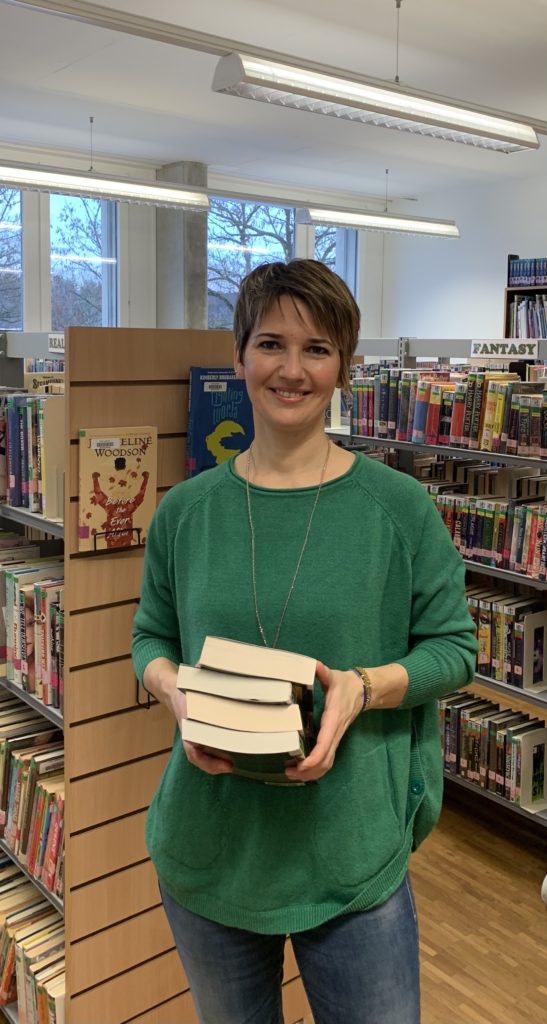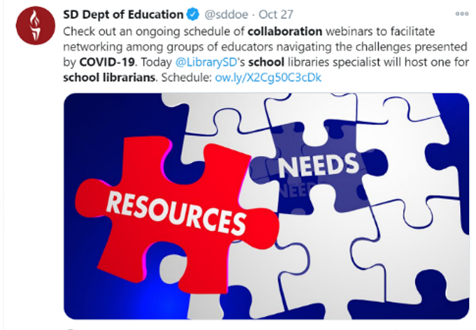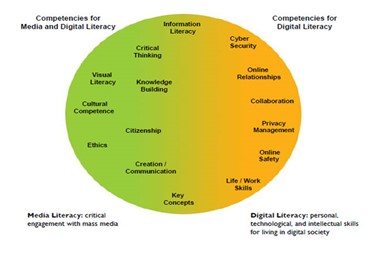New Voices RGU Student Series – Anne Labussiere
Category: New Voices, New Voices, RGU Student Series
In the Robert Gordon University Student Series blog, we share the views of RGU students from the MSc in Information and Library Studies course.
Today, we hear from Anne Labussiere, who is a part-time student on the Information and Library Studies MSc course at RGU. Originally from Brittany in France, Anne moved to Switzerland fourteen years ago and is currently working as a school librarian assistant in the local international school near Zurich. In her blog, Anne discusses the response of the international school library community to the pandemic and explores the interconnected skills that school librarians have evidenced in their response.

Anne works as a library assistant in Zurich. In her blog, she discusses the varied, interconnected skills that have enabled school librarians to support their communities during the pandemic.
The Extended Roles of School Librarians in the 2020 Pandemic
In these unprecedented times, middle school librarians have developed interconnected skills of digital literacy.
Commonly known as the media specialists of their educational institution, middle school librarians are, also highly trained, digitally literate professionals who possess a wide range of digital skill sets, including digital literacy. The American Library Association describes digital literacy as “the ability to use information and communication technologies to find, evaluate, create, and communicate information, requiring both cognitive and technical skills.”
Multi-skilled
Responding to unusual pedagogical needs, school librarians have developed and demonstrated their potential for collaboration with teachers regarding communication and digital content creation (Global Framework of Reference on Digital Literacy Skills for Indicator 4.4.2, UNESCO). Not only is a school librarian a “resource curator, information literacy specialist [and] collaboration catalyst” (Kuhlthau 2015 p.129) but, throughout the ongoing COVID-19 pandemic, they have also acted as a crisis manager by planning and implementing long-term digital solutions to contribute to the viability of schools. Media and digital literacy are two complementary key competencies that school librarians integrate within their practice and from which their patrons can benefit (figure 1.).
Collaborators
The American Association of School Librarians edited a chart about the role of school librarians in Pandemic Learning, which emphasizes the necessity of collaboration between school librarians and their users during the 2020 pandemic. Monteil-Overall defines collaboration as “a trusting, working relationship between two or more equal participants involved in shared thinking, shared planning and shared creation of integrated instruction” (2005 p. 5). Since COVID-19, school librarians have definitely become pedagogical consultants (figure 2.) working with all Learning Teams (EveryLibrary Institute 2020). Indeed, in a challenging context of disruptive in-school and remote home learning, they have worked closely at the forefront with teachers to design and share high-quality e-resources for learning platforms. Farsighted, Kuhlthau already highlighted the necessity of collaborative relationships between school librarians and teachers, making them “vital partners” (Kuhlthau 2010 p.1). In that respect, we can say that the pandemic has reinforced and re-established school librarians’ status in their educational institutions.
Digital practitioners
In the Swiss international school where I work, the subject teachers have urgently enlisted school librarians to contribute to readjusting the content of their digital lessons to maintain the continuum of the Core curriculum. For instance, research and inquiry skills have been taught by the librarian through Google Meet to several classes with interactive tasks to execute and share (by screenshots, recording or instant chats). So, the school librarians have been actively involved in synchronous online co-teaching to “train students and teachers on how to use virtual learning tools” (Maughan 2020 p.45).
Communicators
Furthermore, school librarians have taken up the challenge of rebuilding and activating an online library community. Up to now, in many schools, libraries are still closed to patrons. Thus, school librarians have applied to publishers for free or fee-lifted access to e-learning resources that benefit the whole school. They also have preserved reading for pleasure by investing in digital collections (e.g. SORA Overdrive) and by continuing the communication with their users via virtual book clubs, book talks and story times. By expanding their engagement, they have supported the monitoring of students and families’ well-being, as well as the students’ social-emotional learning. Even the traditional tools, such as the library’s websites or LibGuides, have turned out to be key allies. As a matter of fact, school librarians have made tremendous efforts to keep “communication flowing” (Kuhlthau 2015 p.129).
Networkers

Collaboration webinars to facilitate networking among groups of educators navigating the challenges presented by COVID-19. Source: Twitter 2020.
Moreover, school librarians all over the globe have reached out to each other to work jointly on the sustainability of their roles and to review the professional transformation initiated by the pandemic. Digital resources, tips and “informative conversations” (Caroll 2020 p.2) have been shared via social media like Facebook (e.g., Int’l School Library Connection) or Twitter (Figure 3.), while webinars on Zoom and Google Meets have also flourished. We must bear in mind, though, that in schools over the world, many inequities have emerged in terms of accessibility to digital learning, with some school libraries are completely shut and library school professionals unemployed or reassigned. However, let us conclude on a positive note. Indeed, through and since COVID-19, school librarians have been appraised and acknowledged as “literacy learning leaders” (Mackley 2020). Let’s hope that they finally managed to dismiss the popular cliché of being only fake-news gatekeepers (De Paor 2020) and book providers (Lewis 2020)!
References
AMERICAN ASSOCIATION OF SCHOOL LIBRARIANS. School librarian’s role in pandemic conditions. 2020. [online]. Chicago: ALA American Library Association. Available from: http://www.ala.org/aasl/sites/ala.org.aasl/files/content/advocacy/SchoolLibrarianRolePandemic_Resources_Chart_200713.pdf [Accessed 28.11.2010].
ASSOCIATION OF AMERICAN PUBLISHERS. What publishers are doing to help during the Coronavirus Pandemic.2020 [online]. Washington: AAP. Available from:
https://publishers.org/aap-news/covid-19-response/ [Accessed 28.11.2020].
CARROLL, K., 2020. School librarians shine during uncertain times. Knowledge Quest, 49(1), pp. 4-5.
Cvilservicelocal, 2020, Collaboration, image, Pixabay, viewed 11.11.2020, https://pixabay.com/illustrations/social-media-social-networks-2314696/
DE PAOR, S., HERAVI, B., 2020. Information literacy and fake news: how the field of librarianship can help combat the epidemic of fake news. The Journal of Academic Librarianship, 46(5),102218
KRABBE, P., 2018. The importance of collaboration to integrate digital literacy skills into the curricula. [online] Available from: https://www.softlinkint.com/blog/collaboration-digital-literacy/
KUHLTHAU, C., HEINSTROM, J., TODD, J-R., 2008. The “information searching process” revisited: is the model still useful?. Information Research. [online] 13(4). Available from: http://www.informationr.net/ir/13-4/paper355.html#Kuhlthau2004 [Accessed 24 January 2021]
KULTHAU, C.C., 2010. Guided inquiry: school libraries in the 21st century. School Libraries Worldwide, 16(1), p.1.
KUHLTHAU, C.C., 2015. Guided Inquiry Learning in the 21st Century. ABC-Clio. p.129.
LEWIS, M.,2020. Advocating for the school library through relationships. Knowledge Quest, 49 (1), pp.46-51. Available from: https://web-b-ebscohost-com.ezproxy.rgu.ac.uk/ehost/detail/detail?vid=0&sid=a4f49638-d037-43d5- ad4d-875e42d9297c%40pdc-v-sessmgr01&bdata=JkF1dGhUeXBlPWlwLHNoaWImc2NvcGU9c2l0ZQ%3d%3d#db=llf&AN=145424131 [Accessed: 24 January 2021]
MACKLEY, C., CHRASTKA, J., 2020. Librarians at the heart of school renewal and transformation. Every Library Institute. [online] Available from: https://www.studentsneedlibrariesinhisd.org/uploads/8/5/0/2/8502254/school_librarians_covid_slide_report_-_everylibrary_institute_2020.pdf [Accessed: 24 January 2021]
MAUGHAN, S., 2020. Supporting school librarians through Covid-19 and beyond. Publishers Weekly, 267(33), pp. 20-28.
MONTEIL-OVERALL, P., 2005. Toward a theory of collaboration for teachers and librarians. School Library Media Research, 5, 1–31. Retrieved from http://www.ala.org/aasl/slmr/volume5.
SOUTH DAKOTA Dept OF EDUCATION.2020. Collaboration webinars to facilitate networking among groups of educators navigating the challenges presented by COVID-19. [@sddoe]. 27.10.2020. Available from: https://twitter.com/sddoe [Accessed 16.11.2020]. Screenshot by author.


